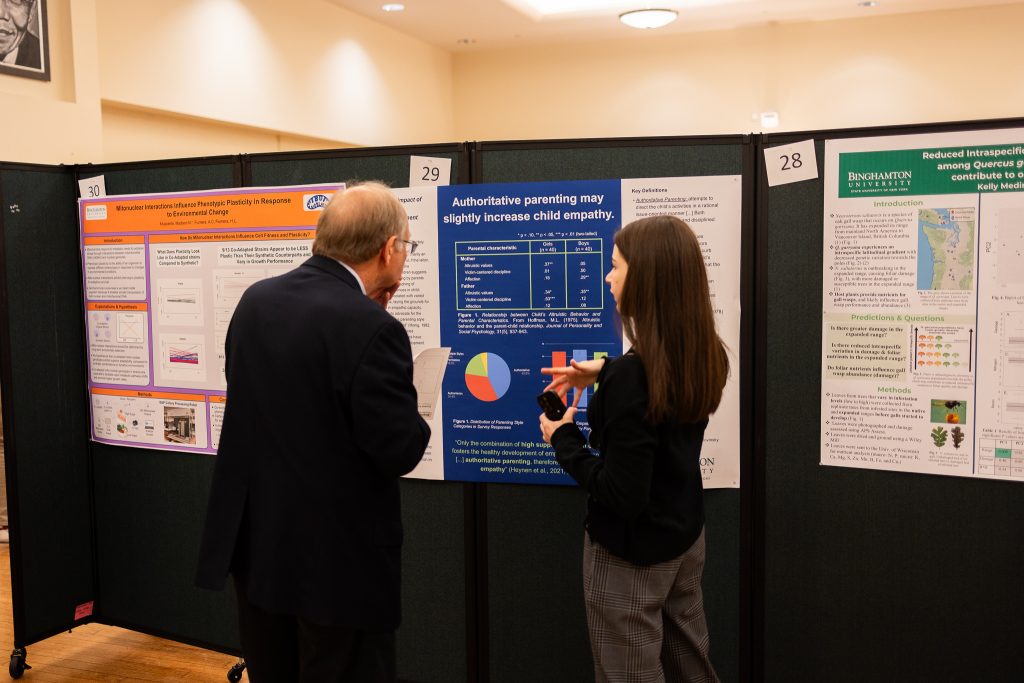Students, faculty and staff participated in research-immersive events this past week during Binghamton University’s annual Research Days celebration.
Various areas of study were spotlighted at a series of different campus events from April 15 to 19. These included community-engaged research, speakers, panels and research-based competitions. The week concluded with a series of student poster presentations on Friday in Old Union Hall and the Mandela Room, allowing both undergraduate and graduate students to share their research with the larger campus community.
“[It’s] just a spectacular enhancement to the way that you learn,” said Rachel Coker, the director of the Office of Research Advancement and chair of the Research Days Steering Committee. “You’re learning a real-world application to something. You’re thinking about not only, ‘I have to learn this research method,’ ‘I have to learn how to do this thing at the library’ or ‘I have to learn how to use the pipette in this way,’ but you right away can connect it to something that’s meaningful.”
This year’s keynote speaker, Amy Aines — a communication strategist, speaker and the author of “Championing Science” — kicked off the week addressing three listener-centered habits. The first, “Connect First,” requires speakers to introduce themselves relatably to increase listener interest. The next, “Be Understood,” means the speaker should communicate in an accessible manner, including using concrete and conversational language. The final habit is to “Design for Brain Wiring,” applying information about attention and memory to create schemas, an organizing principle, to help listeners remember the talk.
“I had a chance to see community engagement posters about issues like high fall rates [in nursing homes] and meth use and ways to help build socio-emotional skills for children,” Aines wrote. “I could see how energized the researchers were about what they had learned and how their research can be a positive catalyst for change.”
As the week continued, other events included the Latin American and Caribbean Area Studies research panel, where majors and minors presented posters and other mediums of their work. On Thursday, graduate students participated in the Three Minute Thesis, where they presented their research to a non-specialist audience with limited time using a PowerPoint template.
There were three 90-minute sessions of poster presentations on Friday from students of all programs, as well as one digital poster presentation session for students who chose to utilize an online medium to present their research. Students participating in the Source Project, a first-year program that allows students to gain research experience in humanity-based subjects, also shared their work.
Caroline Antalak ‘16, the Source Project’s program coordinator who organized the three poster sessions, said the event featured the most posters in its history. She added many other R1 Research Institutions, like BU, do not give their first-year students opportunities to pursue research at the beginning of their college careers.
“I think that research gives you a lot of crucial academic skills, but also a lot of skills that are transferable to the professional world,” Antolak said. “I think it’s really important to gain these experiences early on so you can continue to build on those skills.”
Mary Givens, a freshman double-majoring in political science and history in the “Mapping American Prejudice” Source Project stream, researched the Ku Klux Klan’s presence in upstate New York and the Finger Lakes region. She said she noticed a neglect in research about the Klan’s presence in more rural areas, inspiring her to pursue this topic.
Aeryn Zahn, a freshman majoring in environmental science, was part of the Source Project “Bookmaking” stream, where she chose a book from the library’s Special Collections to study and traced its owners to learn about their lives.
“The most interesting owner I found was Sir Hans Sloan,” Zahn said. “He had a 50,000 book collection that when he died, he donated it to the British Parliament, and they used it to found the British Museum. So this book was actually part of the British Museum for about 20 years, and then they sold it, and it went through a bunch more owners, and now we have it.”
One group from the Human Sexuality Research Lab presented their research titled “The Ick Factor: A Study in Age Gap Relationships,” exploring the tendency to criticize such relationships in Western society. They found that it was less socially accepted for an older woman to date a younger man than for an older man to date a younger woman.
“Over 40 percent of [undergraduates] conduct research before graduating,” Stephen Ortiz, director of the External Scholarships and Undergraduate Research Center, wrote. “This is a very high percentage compared to other colleges and universities and a testament to our faculty, our innovative research programs such as the Source Project and the First-Year Research Immersion program, and to our students’ passion for high-impact learning.”
Editor’s Note: Antalek would like to thank Rachel Coker, The Research Days planning committee, Steve Ortiz, Director of ESURC, all of the student workers in ESURC, Beth Polzin, Associate Director of ESURC and the first-ever cohort of Source Project Peer Mentors.



